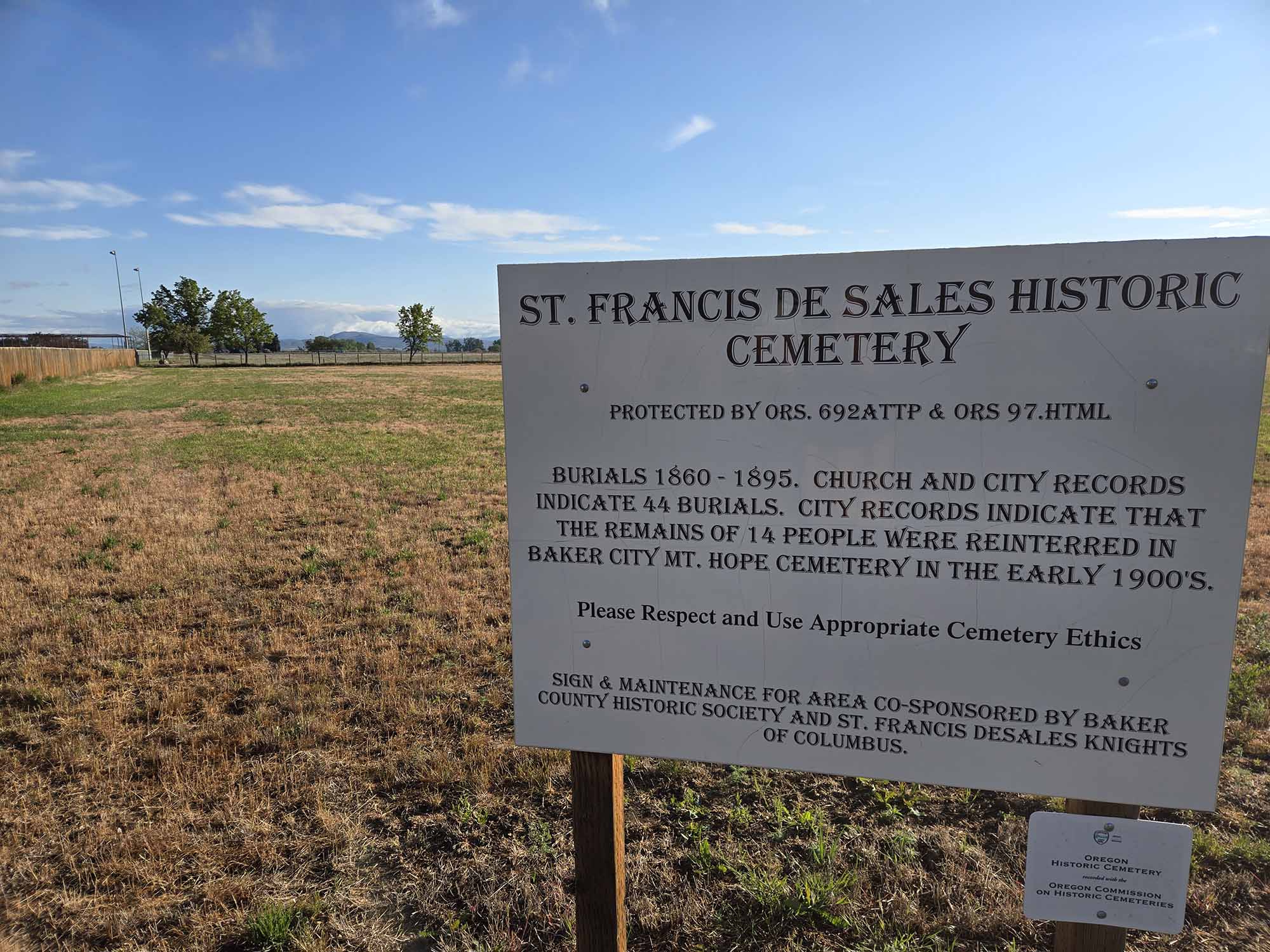Wolf scene shifts from Keating to Salem
Published 10:43 am Friday, April 17, 2009

- Sharon Beck, Union County rancher and former chair of the Wolf Task Force, ponders the information Thursday night provided by Curt Jacobs about 24 lambs killed at his ranch by wolves. Bob Beck is in the background. (Baker City Herald/S.John Collins)
Ranch and farm groups want to pay Curt Jacobs’ way to the Capitol so he can lobby about predation
Trending
Ranchers from across the state called on the Oregon Legislature to
schedule a hearing on House Bill 3383 after listening to Curt Jacobs
describe in gruesome detail how a pair of wolves ventured out of the
Trending
Eagle Cap Wilderness and went on a lamb killing spree at his family
ranch in Baker County.
During a packed meeting of the Baker County Livestock Association
Thursday evening, Jacobs reported the death toll from two confirmed
wolf attacks at his ranch April 9 and April 13 has risen to 24,
including 23 two-month-old lambs and one ewe who died of wounds
apparently suffered while trying to defend her twin lambs from the
wolves.
Before the meeting ended, the association passed a resolution authorizing funding to pay for Jacobs to travel to Salem to present his account of the wolf depredation computer slide show to the Legislature, and representatives of the Farm Bureau and Oregon Cattlemen’s Association offered to pay part of Jacobs’ expenses as well.
Jan Kerns, a Baker County farmer and member of the Oregon Board of Agriculture, made the motion to fund Jacobs’ trip, and she suggested Jacobs stay in Salem a few days and make the rounds to talk with Rep. Brian Clem, chairman of the House Agriculture, Natural Resources and Rural Communities Committee who has been asked to schedule a hearing for HB 3383, as well as to legislators from districts from other districts, including urban districts that may not be aware of the situation or why a bill to help ranchers protect their livestock is needed.
The 24th victim is a lamb that died Wednesday, despite two days of nursing with antibiotics and pain medicine. The lamb died from wolf bites inflicted sometime Sunday night or before daylight Monday morning, when the wolves were caught on camera inside a fenced pen next to some of the lambs they killed, Jacobs said.
Jacobs narrated a video showing the bodies of dead lambs, with close-up footage of bite wounds on the front shoulders that killed 19 of the lambs. The film also featured photos of chest cavities ripped open on three lambs when then the wolves ate their hearts, as well as the livers of two of the lambs.
“One of the lambs that had been pretty well gutted had been drug around,” Jacobs said.
On the morning of April 10 when ranch hands discovered 16 dead lambs and several others injured in the attack, Jacobs said the bodies of several of his ewes were also scattered around inside and outside the pen. At first he thought they were dead as well, but it turned out they were lying down due to a combination of fear and exhaustion.
“They ran them so hard they pushed them through the fence,” Jacobs said. “They were just laying there. They were traumatized, too scared to move.”
“One lamb is still alive. You can see the bite marks. We’ve been doctoring him, but he can hardly get up,” Jacobs said. “One ewe is having trouble walking. When she stops, her leg flops back, and she drags her legs.”
Two ewes suffered broken shoulders and are limping around, he said.
Before the motion-sensing camera caught the wolves in the act, Jacobs said the ODFW investigation appeared to be focused on pinning the blame on his dogs, a neighbor’s dogs or coyotes, even though the tracks and method of attack pointed toward wolves.
“I don’t think they would have confirmed it was wolves without the photos,” Jacobs said.
Under current federal and state endangered species laws, ranchers are not allowed to kill wolves caught in the act of attacking livestock. However, federal ESA protections are set to expire under a May 4 de-listing by the U.S. Fish and Wildlife Service for the Northern Rockies region, which includes Northeastern Oregon.
Ranchers and others attending Thursday’s meeting called for a united effort to lobby Oregon lawmakers to schedule a hearing on House Bill 3383 and pass amendments giving ranchers authority under the state ESA to track down and kill wolves involved in livestock depredation.
Peggy Browne, president of the Baker County Farm Bureau, said that Friday is the deadline set by the legislative leadership for scheduling a hearing for bills this session.
That gives farm and ranch groups until the end of the day to convince lawmakers to place House Bill 3383 on a committee schedule for a future hearing date. If that effort fails, Browne said the bill will likely die.
“I talked to Barry Bushue, president of the Oregon Farm Bureau. We really want to help get that bill a hearing,” Browne said.
Browne, Dan Forsea, president of the BCLA, and Bill Moore of Unity, president of the Oregon Cattlemen’s Association, said they have contacted Rep. Cliff Bentz, R-Ontario, and other sponsors of HB 3383, including Senate Minority Leader Ted Ferrioli, R-John Day, urging them to pressure Rep. Brian Clem, D-Salem, chairman of the House Agriculture, Natural Resources and Rural Communities Committee, and the Democratic leadership to schedule the hearing.
“If we get a hearing, we need to show up and pack the room,” Moore said.
At Thursday’s meeting, they also called for a groundswell of phone calls and emails from farmers and ranchers telling Clem and other legislators representing every part of the state how important this bill is to the welfare of Oregon’s cattle and sheep industries.
Kerns and Rodger Huffman, state brand inspector with the Oregon Department of Agriculture, also told those attending the meeting that Clem was instructed to schedule a hearing on HB 3383.
Rod Childers, chairman of the OCA wolf committee, said the bill in its current form as drafted by the legislative counsel only authorizes ranchers to kill wolves in the act of biting or attacking sheep, which falls short of the language requested by the OCA.
However, he said if the Democratic leadership allows a hearing on the bill, it can be amended in the committee to include the broader language allowing wolves that chase or attack livestock to be tracked down and killed.
Fred Warner Jr., chairman of the Baker County Board of Commissioners, said if HB 3383 gets scheduled for a hearing he and other commissioners will come to testify in support of the bill and amendments sought by the OCA.
In a way, Warner said, the Keating wolf depredation case might provide the public support needed to get a hearing for HB 3383, Warner said.
Warner said Baker County Commissioners always felt this would be one of the first areas to experience wolf depredation of livestock after the state reversed its policy of returning wolves to Idaho when they strayed into Oregon. That policy was used just once, in 1999, when a wolf made its way into Oregon from Idaho, where a wolf recovery program was supposed to be limited to the Northern Rockies in Idaho and Yellowstone National Park in Montana and Wyoming.
The first transplanted wolves confirmed to have entered Oregon passed through Baker County before it was trapped in Grant County in 1999 and returned to Idaho.
Since then the laws have changed to the point that Jacobs said ODFW officials told him if they are lucky enough to trap one or more of the wolves that attacked his sheep, they’ll fit it with a radio collar and turn it loose right there.
After two days of unsuccessful trapping efforts and installing flag fencing around the sheep pens to discourage further wolf attacks, Russ Morgan, ODFW wolf coordinator, and Carter Niemeyer, a retired Wildlife Services wolf tracker who volunteered to help out, have moved on to higher ground in hopes of trapping one of the wolves near the timberline, which starts about five or six miles from the Jacobs ranch.
Jacobs told those attending Thursday’s meeting that photos and other information from the sheep attacks at his ranch were sent to a wolf specialist at Montana Sate University, who said the wolves involved in the attack are younger wolves, most likely part of a pack that’s been established nearby on the fringe of the Eagle Cap Wilderness, which begins 15 miles from the sheep pens, and the homes, barns and shops on the Jacobs ranch.
“You better tell everybody with a cow or a calf to start looking around, because you’ve got a pack out there, and these are the young ones. There’s some older, bigger wolves out there in the woods,” Jacobs said in relaying the advice he received from the Montana State University wolf specialist.
“These two (that attacked the Jacobs sheep) are out checking around for food. It’s been a tough winter. The deer and elk are starting to get smart and run off.”
Sharon Beck, a past president of the Oregon Cattlemen’s Association and former chair of the OCA wolf task force, expressed concerns about possible violations of protocol and the chain of command laid out in the Oregon Wolf Plan and the state and federal ESA rules.
She suggested Jacobs demand that USFWS take its place ahead of ODFW as the lead agency for investigating wolf depredation of livestock.
“Unless we hold OFDW accountable, they are not going to do the right thing,” Beck said.
John Hays, a past OCA president, suggested Jacobs contact the state attorney general’s office if he feels he has been damaged by the ESA.
“If you are harmed by the ESA, the attorney general is supposed to investigate on your behalf,” Hays said.
Jacobs said the case is taking a personal toll. He’s losing sleep worrying about more wolf attacks in the middle of the night, and between helping out with the ODFW investigation, dealing with media calls and visits to the ranch by representatives of a variety of agencies and organizations, he’s having a hard time getting his ranch chores done.
“I might have to convert my four-wheeler to a tour bus and get my wife (Annie) to bake some cookies and pack some lunches for everybody,” Jacobs said.
Rep. Brian Clem, D-Salem, chairman of the House Agriculture, Natural Resources and Rural Communities Committee, can be contacted by phone at 503-986-1421 or via e-mail at rep.brianclem@state.or.us.








